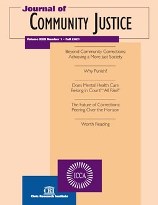Complete Issue
Author: Donald G. Evans.
Source: Volume 26, Number 01, Fall 2016 , pp.1-28(28)

< previous article |return to table of contents
Abstract:
The three articles in this issue consist of an evaluation of a faith-based diversion and reentry program, the Mead Award acceptance speech on perceived racial bias in the criminal justice system, and a practitioner’s view on marijuana legalization. Drs. Melinda Roberts and Melissa Stacer, from the University of Southern Indiana’s Department of Criminal Justice, have report on the results of their evaluation of the faith-based program Churches Embracing Offenders (CEO). The authors sought to answer three questions: What are the factors that distinguish between graduates and non-graduates of the CEO program? What factors are predictive of graduating from the program? And what factors distinguish between graduates of the CEO program who were rearrested and those who were not? The results are both interesting and insightful. Further research that interviews clients in faith-based programs to obtain qualitative, personal accounts would assist in better understanding the benefits and difficulties of being involved in a program such as CEO as well as in gaining insight into client expectations of such programming. Another benefit from additional qualitative work would be a better understanding of why CEO program graduates had such a low rate of recidivism and would assist in explaining whether it was the program or something else that accounts for the result. In “Courage in the Community of Practice,” John Larivee, the 2015 recipient of the International Community Corrections Association’s Margaret Mead Award, acknowledges in his acceptance speech that those working in the field of criminal justice need to work to close the gap that exists between our justice system and the many communities who believe it is unfair, unjust, and racially biased. He exhorts us to have the courage to stand up for what is just and right and to remember that it is important to keep in mind that justice matters. As more jurisdictions consider the legalization of marijuana, community corrections workers should become more familiar with both the legal and policy implications for the populations they serve. How will legalization, whether for medicinal or recreational use, affect supervision strategies or compliance with specific conditions of release? Dr. Shively’s article, “Marijuana Legalization,” provides a useful discussion starter to get us thinking about the ramifications for this shift in government’s approach to dealing with drug legislation and penalization. The author discusses the pros and cons of the issue and endeavors to think more about the evidence from science as a starting point in developing policy and law.Keywords: Poverty and reentry; faith-based programming; evidence-based programming; marijuana legalization; racial bias; sentencing reform; community corrections
Affiliations:
1: Editor.